Discover Beaver State Podcast
Beaver State Podcast

Beaver State Podcast
Author: Oregon Department of Fish and Wildlife
Subscribed: 98Played: 3,924Subscribe
Share
Description
The Beaver State Podcast is a show produced by the Oregon Department of Fish and Wildlife's Information and Education Team. This show is about fish and wildlife management, hunting and fishing and wildlife viewing in Oregon.
138 Episodes
Reverse
Luke Ovgard grew up fishing around Klamath Lake, but his fishing interests quickly outgrew even the legendary Klamath Lake redband trout that prowl the region. Luke's passion for fishing didn't necessarily mean catching bigger and bigger fish, in fact, it meant catching all kinds of fish, preferably anything that swims. Using techniques like micro fishing, Ovgard's passion for catching as many species as he can has taken him on road trips across America and now to places like the Canary Islands and Monaco. An author, a high-school teacher and now full-time, active-duty U.S. Military in Europe, Ovgard tells us about how he transformed fishing from a hobby to a lifestyle. Show Notes: Luve Ovgard on Instagram Book: Fishing Across America Blog: Caught Ovgard
Hunting and fishing as a group activity might not be everyone's first thought as a place to start, but for many people, especially the growing numbers of women who are participating in hunting and fishing, Facebook groups, meetup apps and community education events have offered an opportunity to do something that can be challenging to learn on your own. For this podcast episode, we talked to Hailey Malone and Claire Grubb, two friends and outdoor enthusiasts from Roseburg, Oregon, who found each other through social media groups and who inspired others around them to get into hunting, fishing, hiking and conservation volunteer opportunities through group activities. Show Notes: While the Mardy Hunters group mentioned in this podcast episode isn't currently active, there are a number of ways to connect with other people to learn hunting and fishing skills. ODFW Workshops and Events Hunters of Color LGBT+ Outdoors Hunting and Fishing Meetup.com
Oregon is not made up of just Douglas fir and Ponderosa pines, even though these are two of the most prevalent trees on their respective sides of the state. Portland-based arbocultural educator Casey Clapp talks to us about trees as habitat, their historical significance on the landscape before settlers showed up and what might happen as our changing climate continues. Show Notes: Book recommendations from Casey Clapp - "Trees to know in Oregon and Washington" Podcasts - Completely Abortrary - https://arbortrarypod.com/ Ologies - Dendrology (Trees) with Casey Clapp - https://open.spotify.com/episode/06NcI40zFZbNW7aOVfncDp
The Oregon Department of Fish and Wildlife's Recruitment, Retention and Reactivation Coordinator Antonio Salgado works with many different community groups teach hunting, fishing and outdoor recreation classes in Spanish. But often works most closely with Oregon-based Hunters of Color, a group whose goal is: Fostering a more equitable and inclusive community for hunters. This partnership has already produced several successful hunting workshops, and this National Hispanic Heritage Month, we sat down with Salgado and HOC co-founder Jimmy Flat to talk about their work reaching out to Hispanic and Latino communities to try and increase participation in hunting, fishing and outdoor recreation. Show Notes - Follow Hunters of Color online Instagram Twitter Facebook
Every year in late summer and early fall, ODFW receives dozens of messages about miniature Great white sharks washing up on Oregon beaches. Turns out these are juvenile Salmon sharks, a relative of white sharks but not the same thing. To find out more about Salmon sharks and why they might be washing up on our shores, we talked to ODFW's Lynn Mattes and the Big Fish Lab's Dr. Alexandra McInturf about this issue for this episode of the Beaver State Podcast.
The needs of humans and the needs of the wildlife that surround us are intensifying. Habitat loss and fragmentation due to human development keep wildlife from finding food, water and shelter. These factors also make adhering to daily, seasonal and life history needs extra challenging and inhibit migratory movements, like moving to and from foraging areas and breeding sites. Dr. Rachel Wheat has been working on the Oregon Wildlife Connectivity Plan, an effort to better understand wildlife connectivity in Oregon. The goal of the plan is to evaluate and map out existing landscape-level connectivity for 54 species that represent a wide range of wildlife species, their habitats and life history strategies and movement capabilities. This information will better inform Oregonians about the needs of wildlife even as we go about fulfilling our own needs. Dr. Wheat talked to Tim Akimoff and Beth Quillian about the project for this week's Beaver State Podcast.
Dr. Kaeli Swift is a researcher and renowned science communicator who loves to unwrap the fascinating world of Corvids for her followers on social media. We caught up with Dr. Swift in Seattle before she left for a new research project she's conducting on the island of Tinian. Dr. Swift talked to us about crows and ravens, their biology, behavior and intelligence in this episode of the Beaver State Podcast. Show Notes: Follow Dr. Kaeli Swift on Social Media - Instagram TikTok Twitter Catch Dr. Swift on the Oologies Podcast talking about crow funerals - Corvid Thanatology (CROW FUNERALS) with Dr. Kaeli Swift — alie ward Book Recommendations - "In the company of crows and ravens" by John Marzluff "Mind of the raven" Bernd Heinrich Check out the crows attacking the Barred owl at Seward Park when this podcast was recorded - https://youtube.com/shorts/_dMpJA84c8M?feature=share
We go bay clamming with Shellfish Program Leader Mitch Vance during a minus-2 tide at Yaquina Bay to illustrate how many different types of clams you can find as well as some of the barriers to entry and challenges to be prepared for. We also talk about how you don't need a minus-2 tide to find bay clams, in fact, you can find them year-round during almost any low tide if you know where to go. This episode was not recorded in the studio and has mic noise from wind and moving around the bay. Show Notes: Bay Clamming Resources – How to start clamming - https://myodfw.com/articles/start-clamming Bay clam identification - https://www.dfw.state.or.us/mrp/shellfish/bayclams/clamid.asp Clamming maps - https://www.dfw.state.or.us/mrp/shellfish/seacor/findings_yaquina_bay.asp Clamming with ODFW Video Series - https://youtube.com/playlist?list=PLLleHsPDijGZIFx_HTQ4zh6f-7j4xL9tr Related episodes – https://myodfw.com/beaver-state-podcast/crabs-and-crabbing-mitch-vance https://myodfw.com/beaver-state-podcast/razor-clams
In this second installment of the Beaver State Podcast Book Club, we convened at the ODFW office in Clackamas to meet with Northwest District Watershed Manager Steve Niemela, District Biologist Dave Keiter and District Public Information Officer Beth Quillian too discuss author Mary Roach's book "Fuzz." This book takes an often humorous look at human/wildlife conflict around the world and compares those experiences with those many Americans experience. We looked at the shared experiences of biologists around the world and the ways in which technology is increasing our awareness of wildlife and the role of educating people about how to live with wildlife. Show Notes - Want to learn more about living with in Oregon? Check out these resources - https://www.dfw.state.or.us/wildlife/living_with/
You know when the salmon and steelhead runs just aren't living up to expectations and someone tells you it's because of ocean conditions? Pretty frustrating, right? The National Ocean and Atmospheric Administration's Dr. Laurie Weitkamp recently conducted a five-week study of the North Pacific to look at all kind of factors from food to water temperature and everything in between to try to get at why certain ocean conditions are so tough on salmon and steelhead. She talks about the findings of that study in this week's Beaver State Podcast. Show Notes: OPB story about salmon study - https://www.opb.org/article/2022/01/31/oregon-scientist-research-vessel-international-expedition-study-salmon/ A salmon's time in the ocean is a black box - https://crosscut.com/environment/2023/04/can-united-nations-help-save-pacific-salmon Stoplight Table https://www.fisheries.noaa.gov/west-coast/science-data/ocean-conditions-indicators-trends
Children's author and illustrator Katherine Roy has tackled topics like sharks and elephants in books but more recently she has turned her brushes and words loose on the topic of reproduction in her latest book, "Making More - How Life Begins." We talked to Katherine for this episode about how a project like that comes together and what makes for effective science communication in elements like art and words for complex topics like the biology of reproduction. Show Notes: Illustrator and Author Katherine Roy Website: https://www.katherineroy.com/ Instagram: https://www.instagram.com/katherineroystudio/
Oregon was one of the first places in the world to observe the direct impacts of ocean acidification when the oyster hatchery production collapsed in 2007. Dr. Caren Braby, former Oregon Department of Fish and Wildlife Marine Resources Program Manager and Laura Anderson, former ODFW Commissioner and founder of Local Ocean Seafoods in Newport, talk us through the history, science and ongoing efforts to study and minimize impacts of ocean acidification and hypoxia. We look at current and potential future impacts on Oregon's ocean fisheries and talk about what Oregonians can do now to help protect our natural resources in the future. Clockwise: Dr. Caren Braby, Laura Anderson and Tim Akimoff Show Notes - What is Ocean acidification Ocean Acidification and Hypoxia Action Plan Changing Waters on the Oregon Coast Video
We read Kirk Wallace Johnson's "The Feather Thief" for this inaugural episode of the Beaver State Podcast Book Club, and we really enjoyed it. It's a fantastic crime story, a first-rate science explainer about the Age of Exploitation and peek behind the curtains of a small group of fly tyers who collect exceedingly rare feathers. This first Book Club podcast episode features fly fishing author and historian John Shewey and biologist Emily Weidner, who recommended the book and inadvertently influenced us to start a book club. From top left - John Shewey, Emily Weidner and host Tim Akimoff Show Notes: Previous Episodes featuring John Shewey - https://myodfw.com/articles/beaver-state-podcast-episode-81-steelhead-fly-fishing-history-john-shewey Please feel free to contact us via email - Beaver_State_Podcast@odfw.oregon.gov
Trumpeter swans may be recognizable by their loud, old-car-horn honking calls, but Oregon's largest waterfowl species is still considered cryptic, because they tend to hang out around another large, white swan called Tundra swans. This makes counting Oregon's Trumpeter swans challenging. To add to the challenges, you have Trumpeter swans that use the Pacific Flyway part of Western Oregon and a unique Rocky Mountain population of Trumpeter swans that sometimes use areas like Summer Lake and Malheur National Wildlife Refuge as wintering areas and breeding areas. This week's podcast takes you on an adventure to count swans at Summer Lake Wildlife Area, where managers have been working to establish a breeding population. We spend the day with ODFW's Statewide Waterfowl Coordinator Brandon Reishus learning about efforts to count and preserve these amazing birds. Show Notes: Lear more about Oregon's Trumpeter swans here - https://myodfw.com/wildlife-viewing/species/trumpeter-swan#:~:text=Historically%20hunted%20to%20the%20brink,wingspan%20define%20this%20magnificent%20bird. Questions or suggestions for topics, please email us at: Beaver_State_Podcast@odfw.oregon.gov Subscribe to the Beaver State Podcast through Apple Podcasts, Stitcher, Google Play Music or Spotify.
Dishaun and Caleb Berry are your typical father and son anglers who love to spend a day fishing together. But they grew up in very different eras. Dishaun, who founded Get Hooked LLC, a project that teaches at-risk and inner city youth how to fish and enjoy the outdoors, started out fishing piers in Santa Monica as a kid before moving to Oregon at a time when he did not see many other Black men out fishing, especially fishing for salmon or steelhead. Caleb, who is 25, has grown up with a few more role models in his father and uncles, who have used YouTube and social media to showcase their fishing adventures as Black men, fathers and passionate advocates of getting People of Color outside. In this episode, we float the Wilson River with Dishaun and Caleb Berry, and you get to hear the adventure, including all the joy associated with hooking and landing a large, hatchery steelhead. Watch a video of the trip on Instagram or TikTok
Welcome to the 4th season of the Beaver State Podcast! In this episode, Tim and Nicole talk about Conservation Leaders for Tomorrow, a program that provides natural resource professionals training in the diverse values and important roles of hunting and its impact on conservation. Tim went through the program in 2015, and Nicole completed the training this year. In addition to completing a Hunter Education course, Nicole learned about trapping and shotgun shooting and safety skills. She wrapped up her CLFT course in Utah by participating in her first-ever pheasant hunt. Learn more about Conservation Leaders for Tomorrow What's coming up on the Beaver State Podcast – Don't forget about the Beaver State Podcast Book Club. We're currently reading "The Feather Thief" by Kirk Wallace Johnson and will be discussing the book with USFWS biologist Emily Weidner and writer and fly-fishing historian John Shewey. - https://myodfw.com/articles/beaver-state-podcast-bonus-episode-beaver-state-podcast-book-club Questions or suggestions for topics, please email us at: Beaver_State_Podcast@odfw.oregon.gov
So, how does this book club work? We'll be reading four books a year, or one book each quarter to be discussed in a podcast episode during that quarter. We'll have guests that relate to the topics in the book as well as a special representative of the podcast audience to join us to discuss the book. The first book for the first quarter of 2023 will be "The Feather Thief," by Kirk Wallace Johnson. I highly encourage folks to pick up a copy at your local library or your local bookstore. Or pick it up through an audiobook subscription and give it a read or listen while the podcast is on hiatus through January. In early February, we'll return with the 4th season of the Beaver State Podcast and with a special Book Club Episode with special guests Emily Weidner a biologist from Bend, Oregon, and fly fishing and fly-tying author John Shewey to cover the fascinating world of high-end fly tying. How can you get involved? Send us an email at Beaver_State_Podcast@odfw.oregon.gov, and let us know why you'd like to participate in the podcast. You'll need to be able to travel to Bend, Oregon in late January to participate or be able to participate through a Zoom or other digital connection. But we'd love to have one representative of the podcast audience to be part of that book club conversation with us. We'll announce the next book in the series shortly after we publish the first book club podcast to give everyone enough time to read the next book.
In this last episode of Season 3 of the Beaver State Podcast, we delve into the stories of Oregon's native minnows, especially the Oregon chub, arguably one of the most famous fish in the world as the first fish ever delisted from the federal Endangered Species List. We also touch on the more-recently delisted Borax Lake chub and some of the joys and challenges of working with these super-important fish that often go unnoticed by the general public and anglers alike. Our guest this week is USFWS Aquatic Ecologist Brian Bangs, who has a bend in the Willamette River named after him for the role he played in the recovery of the Oregon chub. Questions/Ideas, email us - Beaver_State_Podcast@odfw.oregon.gov
The Salmon Trout Enhancement Program, or S.T.E.P, has been around since the early 1980s, an effort by the Oregon State Legislature to put Oregonians more closely in touch with the management of natural resources, chiefly by way of allowing volunteers to help raise more fish. Like many programs, S.T.E.P has evolved over the years and now includes a strong educational component that brings salmon and trout eggs into classrooms, allowing students to see the salmon/trout lifecycle up close. Volunteering and education remain the two biggest aspects of the program as chat with program coordinator Marty Olson, former S.T.E.P biologist Karen Hans and current S.T.E.P biologist Gary Vonderohe.
Sauvie Island may be the undisputed heavyweight of Oregon waterfowl hunting locations, but it isn't the only sweet spot in the state. Summer Lake, Klamath, the high desert, the Columbia and Willamette rivers and coastal estuaries all offer excellent waterfowl hunting opportunities if you're up for an adventure. ODFW's migratory gamebird coordinator Brandon Reishus takes us on a tour of Oregon's best waterfowl destinations in this week's episode. Want to leave us a note? email us at: Beaver_State_Podcast@odfw.oregon.gov


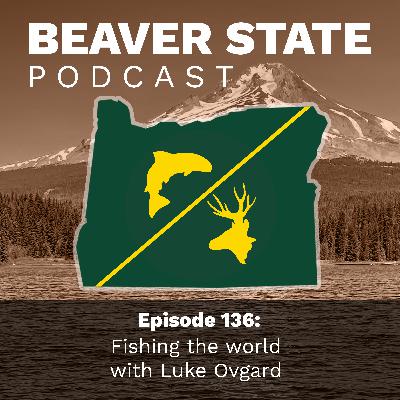
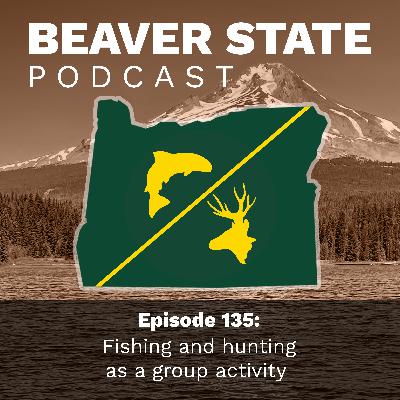
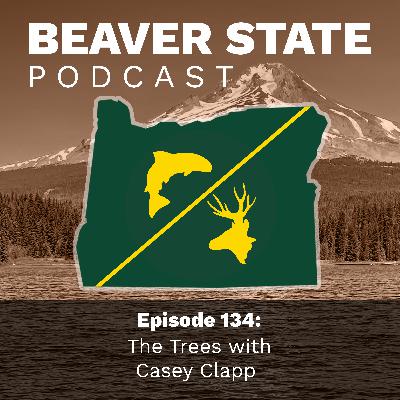
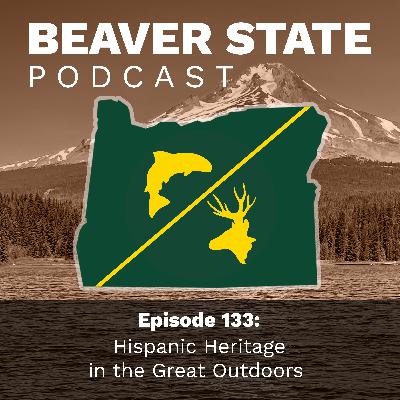
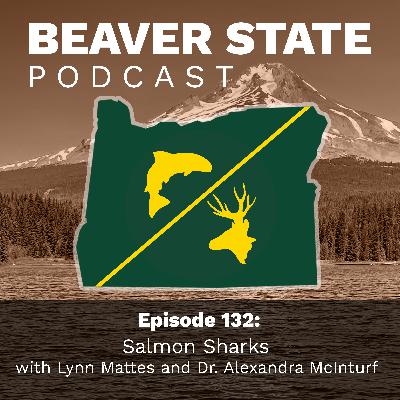
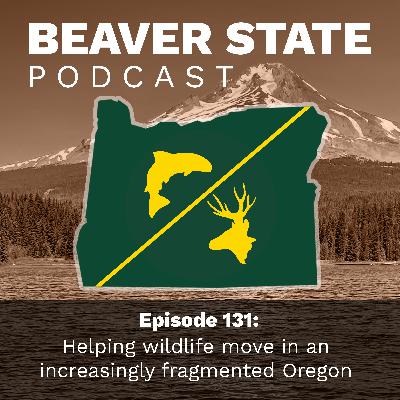
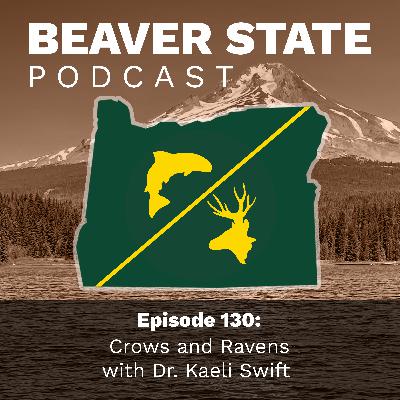
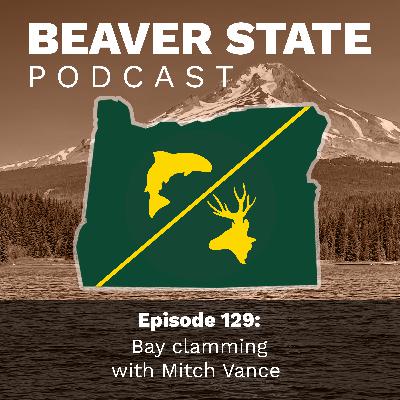
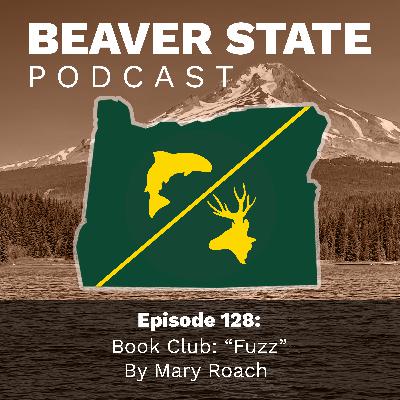
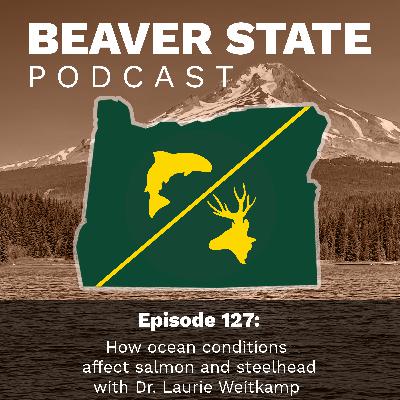
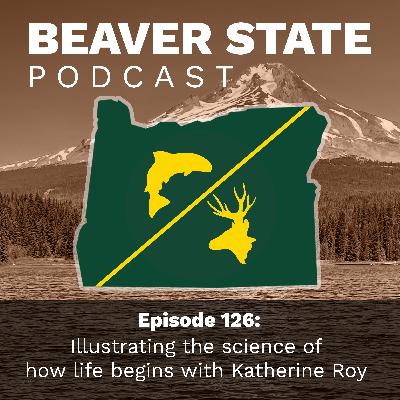
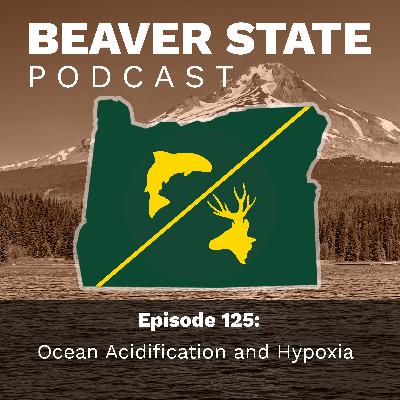
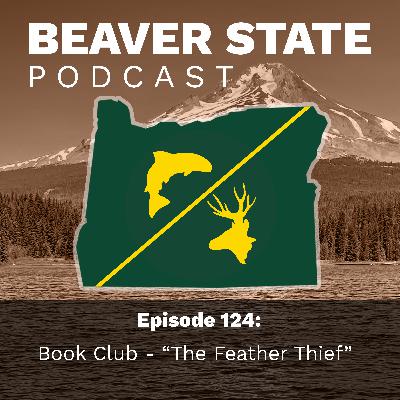
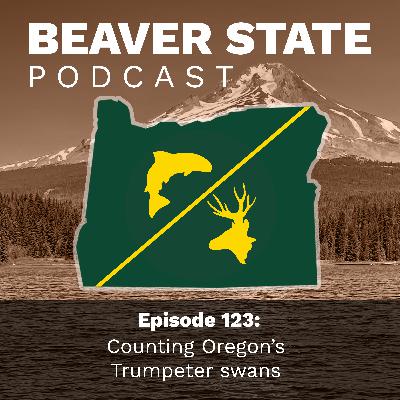
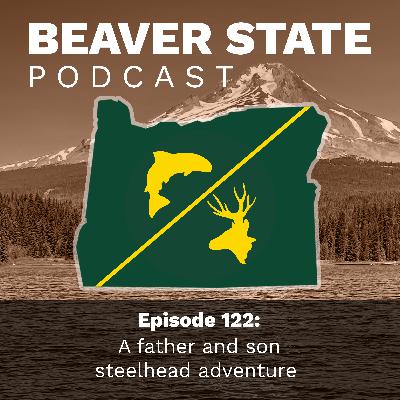
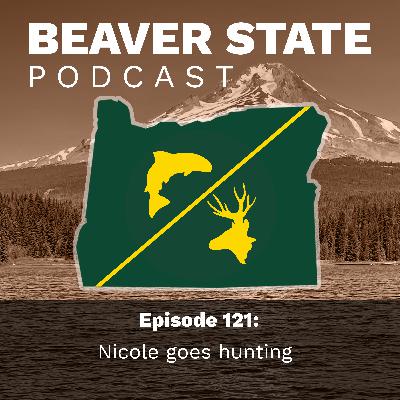
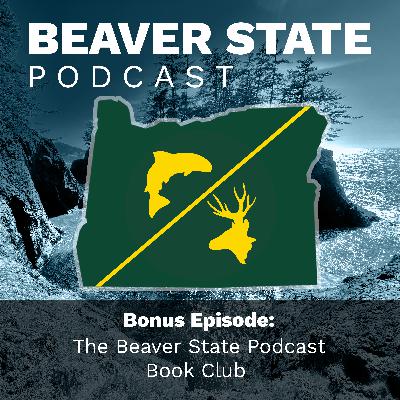
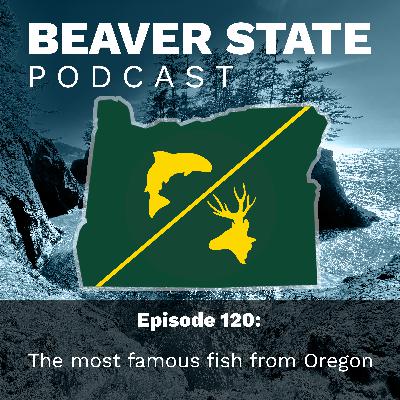
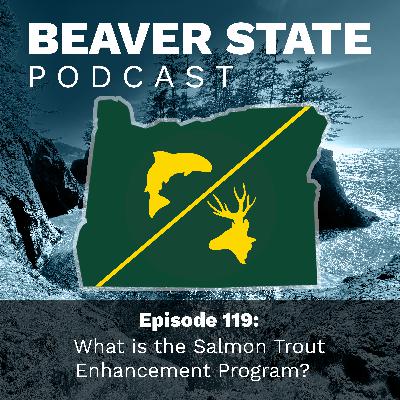
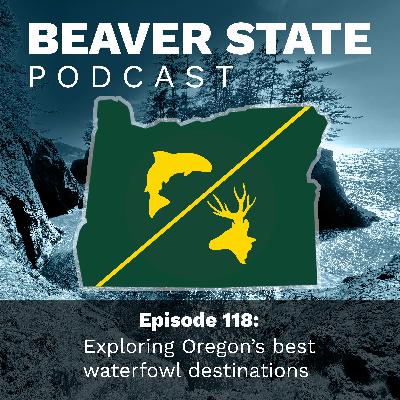



Very informative. Makes me want to go catch a channel cat!